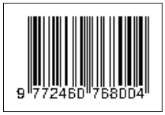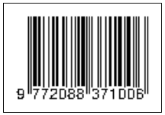Analisis Spesifisitas Terhadap Sensor NPK
Ivan Lionel(1*), Abdul Ro'uf(2), Bakhtiar Alldino(3)
(1) Program Studi Elektronika dan Instrumentasi, FMIPA UGM, Yogyakarta
(2) Departemen Ilmu Komputer dan Elektronika, FMIPA UGM, Yogyakarta
(3) Departemen Ilmu Komputer dan Elektronika, FMIPA UGM, Yogyakarta
(*) Corresponding Author
Abstract
Insufficient use of fertilizers results in non-optimal plant growth, while excessive use is wasteful and results in pollution. Sensor usage is one method for measuring the nutrient content in the soil so that the fertilization process can be carried out precisely. Accuracy, precision, and error are commonly used in analyzing sensor quality. But for chemical measurements, the specificity also needs to be analyzed. This is because the soil contains various types of nutrients, so it is necessary to know whether the readings from the sensor only come from the desired nutrients or the others. In this writing, the elements measured were N, P, and K which are nutrients needed by plants in large quantities. The sensors were tested using compounds containing N, P, or/and K elements and NPK fertilizers with different NPK ratios. Results of this study prove that the sensor is not specific as the readings are known to use the electroconductivity method as proved by the regression results between the two variables which have R² ≈ 1 correlation. In addition, the sensor also produces readings for elements/compounds that should not be read and cannot distinguish the ratio of types of compound NPK fertilizer with different types.
Keywords
Full Text:
PDFReferences
[1] R. P. Potdar, M. M. Shirolkar, A. J. Verma, P. S. More, and A. Kulkarni, “Determination of soil nutrients (NPK) using optical methods: a mini review,” J Plant Nutr, vol. 44, no. 12, pp. 1826–1839, Jul. 2021, doi: 10.1080/01904167.2021.1884702.
[2] 普锐森社, “Five-pin soil transmitter (Type 485) PR-3001-TR-ECTHPH-N01 Ver 2.0.” 2021.
[3] Alabama A&M & Auburn University, “Nutrient Content of Fertilizer Materials ,” 2008. Accessed: Nov. 13, 2022. [Online]. Available: https://www.aces.edu/wp-content/uploads/2018/11/ANR-0174_NutrientContentFertilizerMaterials_103119L-1.pdf
[4] Phosphatesfacts.org, “The Use of Phosphates For Potable Water Treatment.” 2015. Accessed: Nov. 13, 2022. [Online]. Available: https://phosphatesfacts.org/wp-content/uploads/2015/09/The-Use-of-Phosphates-For-Potable-Water-Treatment.pdf
[5] G. L. Terman, D. R. Bouldin, and J. R. Lehr, “Calcium Phosphate Fertilizers: I. Availability to Plants and Solubility in Soils Varying in pH,” Soil Science Society of America Journal, vol. 22, no. 1, pp. 25–29, Jan. 1958, doi: 10.2136/sssaj1958.03615995002200010008x.
[6] Inc. Foliar Nutrients, “Dipotassium Phosphate (176407) Fact Sheet.” United States Environmental Protection Agency, 2002. Accessed: Nov. 13, 2022. [Online]. Available: https://www3.epa.gov/pesticides/chem_search/reg_actions/registration/fs_PC-176407_11-Oct-02.pdf
[7] H. Martin., “Studies Upon The Copper Fungicides,” Annals of Applied Biology, vol. 20, no. 2, pp. 342–363, May 1933, doi: 10.1111/j.1744-7348.1933.tb07770.x.
[8] Howard J. Seltman, Experimental Design and Analysis. 2018. Accessed: Nov. 16, 2022. [Online]. Available: https://www.stat.cmu.edu/~hseltman/309/Book/Book.pdf
[9] Glantz S.A., Slinker B.K., and Neilands T.B, Primer of applied regression and analysis of variance, 3rd ed. McGraw-Hill, 2016.
[10] Raymond Chang, Chemistry, 10th ed. Boston: McGraw-Hill, 2010.
[11] Randy D. Down and Jay H. Lehr, Environmental instrumentation and analysis handbook. Hoboken, N.J.: John Wiley, 2005.
[12] Michael C. Labossiere, 42 Fallacies. Createspace Independent Pub, 2013.
[13] J. B Cederblom and David W Paulsen, Critical reasoning. Belmont (Calif.): Wadsworth, 2012.
Article Metrics
Refbacks
- There are currently no refbacks.
Copyright (c) 2023 IJEIS (Indonesian Journal of Electronics and Instrumentation Systems)

This work is licensed under a Creative Commons Attribution-ShareAlike 4.0 International License.
View My Stats1







